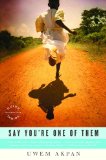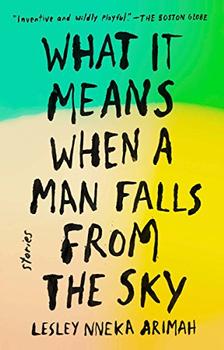Summary | Excerpt | Reading Guide | Reviews | Beyond the book | Read-Alikes | Genres & Themes | Author Bio

Uwem Akpan's stunning stories humanize the perils of poverty and violence so piercingly that few readers will feel they've ever encountered Africa so immediately. The eight-year-old narrator of "An Ex-Mas Feast" needs only enough money to buy books and pay fees in order to attend school. Even when his twelve-year-old sister takes to the streets to raise these meager funds, his dream can't be granted. Food comes first. His family lives in a street shanty in Nairobi, Kenya, but their way of both loving and taking advantage of each other strikes a universal chord.
In the second of his stories published in a New Yorker special fiction issue, Akpan takes us far beyond what we thought we knew about the tribal conflict in Rwanda. The story is told by a young girl, who, with her little brother, witnesses the worst possible scenario between parents. They are asked to do the previously unimaginable in order to protect their children. This singular collection will also take the reader inside Nigeria, Benin, and Ethiopia, revealing in beautiful prose the harsh consequences for children of life in Africa.
Akpan's voice is a literary miracle, rendering lives of almost unimaginable deprivation and terror into stories that are nothing short of transcendent.
I got stumped last year trying to review this book. On the heels of the Oprah's
announcement that Say You're One of Them would be her next book club
pick, I looked back on my abandoned draft. I see two paragraphs with an "x"
marked through them, and written at the bottom: I'm afraid I don't have the
right adjectives to review this book.
Unspeakable things happen to children in these stories, awful things we know are
happening to actual children in the real world. It's hard to explain, then, why
anyone should want to read them. The best I can come up with is that these
stories aren't about the unspeakable things that happen, but about how these children
survive them. It's a small shift, but an important one, and it's the very thing
that makes these stories beautiful and completely un-sensational. Without a
trace of train-wreck fascination, manipulation, or maudlin plea, Uwem Akpen
takes the reader by the hand, as kindly as a child would, inside the story. He
captures the inimitable mind of the child -- endlessly curious, hopeful, funny,
and resourceful even through terror, trauma, violence, starvation…
unfortunately, the list goes on. But at their core, these kids are just like any
others, which makes the stories all the more heartbreaking. - Lucia Silva..continued
Full Review
 (213 words)
(213 words)
(Reviewed by Lucia Silva).
 Uwem Akpan was born in Ikot Akpan Eda in southern
Nigeria. He was ordained as a Jesuit priest in 2003
and received his MFA in creative writing from the
University of Michigan in 2006.
Uwem Akpan was born in Ikot Akpan Eda in southern
Nigeria. He was ordained as a Jesuit priest in 2003
and received his MFA in creative writing from the
University of Michigan in 2006.
He started writing fiction during his seminary days,
at night when the community computers were free but
he lost much of his work to viruses.
Eventually, a friend gave him a laptop which, in his
own words, 'saved me from the despair of losing my
stories and made me begin to see God again in the
seminary.'
"My Parents'
Bedroom", a story included in this, his first book,
was one of five short stories by African writers
...

If you liked Say You're One of Them, try these:

by Elizabeth Weil, Clemantine Wamariya
Published 2019
A riveting story of dislocation, survival, and the power of stories to break or save us.

What It Means When a Man Falls from the Sky
by Lesley Nneka Arimah
Published 2018
A dazzlingly accomplished debut collection explores the ties that bind parents and children, husbands and wives, lovers and friends to one another and to the places they call home.